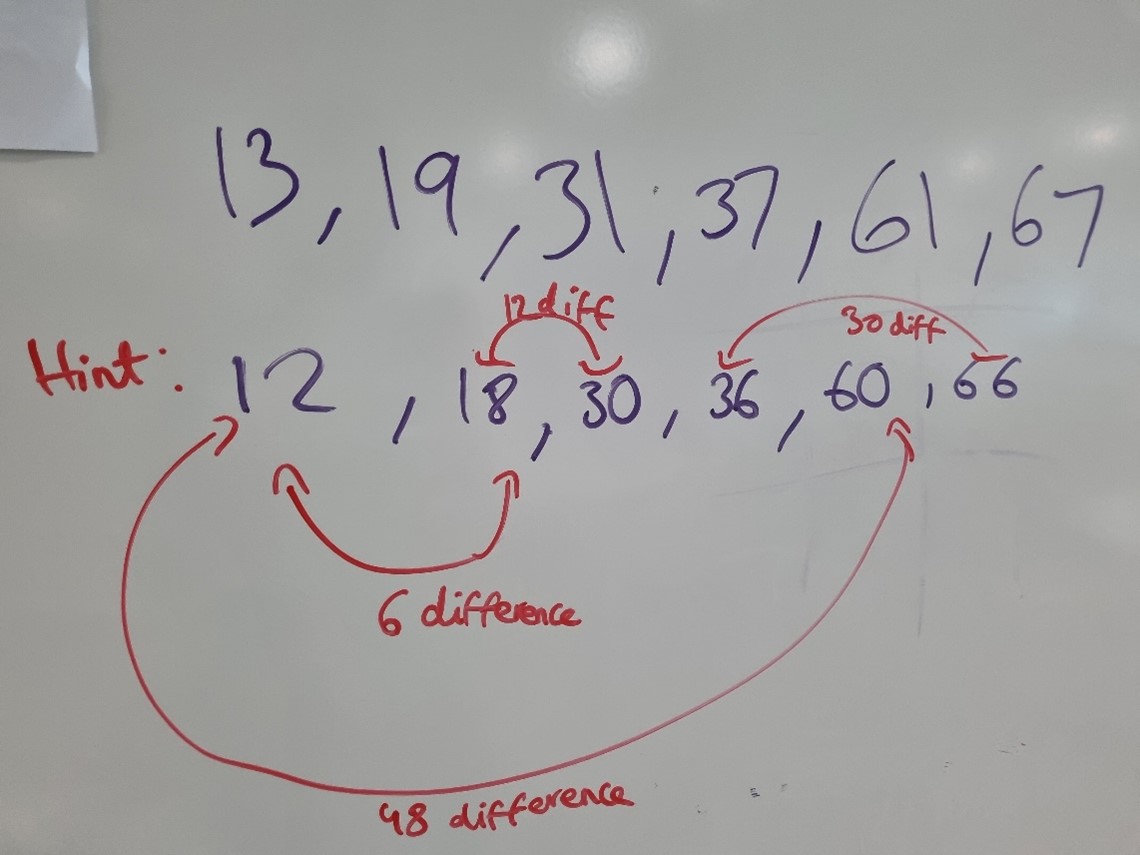Or search by topic
Number and algebra
Geometry and measure
Probability and statistics
Working mathematically
Advanced mathematics
For younger learners
Where Are the Primes?



- Problem
- Student Solutions
- Teachers' Resources
Jayanth from GESS in Singapore noticed what linked the prime numbers:

Here, the difference of any 2 numbers is a multiple of 6. In both the hint & the answer, it’s like that. 6, 12, 30 & 48 are all multiples of 6.
They all have a difference of a multiple of 6 when 2 numbers are subtracted with each other (bigger number subtracting a smaller number, not the other way around).
From comparing the two lists, you can also see that these prime numbers are all one more than a multiple of 6. The prime numbers on the first list are all one less than a multiple of 6.
Yazan from Dubai International Academy in Jordan sent in some great ideas. Yazan uses the word 'composite' to mean 'not prime'.
I don’t think there is a prime greater than 3 which is not one greater or one less than six.
Clarie’s method shows that. For example 13 is a prime number, however, it is $6n+1,$ which means it is one greater than a multiple of six, and 103 is also prime, however it is $6n+5,$ or $6n-1,$ which means it is one less than a multiple of six. All of the primes greater than three are like that.
$6n+3$ is neither one greater nor one less than a multiple of six, but it is a multiple of 3, so they’re composite, except for three which is prime (factors of 3: 1 and 3 only), but we are looking than primes greater than 3.
To conclude, I couldn’t find a prime greater than 3 which is neither one more or one less than a multiple of six.
Sunhari from British School Muscat completed Claire's proof. Sunhari uses $|$ to mean 'is a multiple of' (for example, $3|6$ is another way of writing '3 is a multiple of 6').
$6n+1$ cannot be factorised further, and is therefore a prime.
Note here that $6n+1$ doesn't have to be a prime - for example, if $n=4$
$6n+3 = 3(2n+1)$
Therefore $3|6n+3,$ and $6n+3$ is composite.
$6n+4 = 2(3n+2)$
Therefore $2|6n+4$ and $6n+4$ is composite.
$6n+5$ cannot be factorised, and is therefore a prime.
Note again that $6n+5$ can be prime but doesn't have to be prime - for example, if $n=5$
Suppose $a = 6n+5$
$a + 6 = 6n+5+6$
$a+6 = 6n +6 +5$
$a+6 = 6(n+1) +5$
$a+6 = 6m +5 for $m = n+1$
$a = 6m +5-6$
$a= 6m-1$
Therefore, all primes over 3 can be written as one less or one more than a multiple of 6. (Since any numbers that are not one less or one more than a multiple of 6 are composite.)
You may also like
Adding All Nine
Make a set of numbers that use all the digits from 1 to 9, once and once only. Add them up. The result is divisible by 9. Add each of the digits in the new number. What is their sum? Now try some other possibilities for yourself!
Doodles
Draw a 'doodle' - a closed intersecting curve drawn without taking pencil from paper. What can you prove about the intersections?

